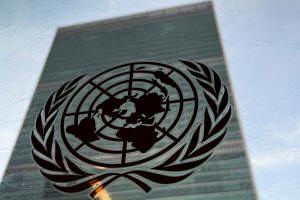|
Grappling with the human rights record of China, a permanent member
of the United Nations' Security Council, is one of the thorniest
among dozens of human rights challenges facing the new high
commissioner since he started in October.
Beijing pressured Turk's predecessor, Michelle Bachelet, not to
publish the report, Reuters revealed, and she only did so in the
final minutes of her term.
The report "is a very important one and has highlighted very serious
human rights concerns," Turk told a Geneva news briefing in his
first public comments on the matter since taking office.
"I will personally continue engaging with the (Chinese) authorities.
I'm very determined to do so," he said. "Hope springs eternal for
changes."
China, which denies the Xinjiang allegations, has previously
indicated that it would close the door to cooperation with the U.N.
human rights office after the report's release.
A Western-led effort to launch a debate on the Xinjiang report at
the Human Rights Council failed in October amid intensive lobbying
against it from China.
The High Commissioner plays a critical role in speaking out against
backsliding on freedoms at a time when autocracies are gaining
influence worldwide at the expense of democracies.
Turk is a former under-secretary general for policy under UN
Secretary-General Antonio Guterres. Some early critics of his
appointment had assumed that Turk would adopt the quiet tactics of
his former boss.
However, the Austrian has since shown a willingness to publicly
accuse Iran of "unnecessary and disproportionate use of force"
against protesters, and has taken the Taliban to task for what he
described on Friday as the "systematic exclusion" of women and girls
in Afghanistan.
Turk has also undertaken trips to Sudan and Ukraine, where he
released a report on killings of hundreds of civilians by Russian
forces in the early days of Moscow's invasion. Moscow has repeatedly
denied targeting civilians in Ukraine.
At the same briefing, he drew attention to a series of "forgotten
crises" in Haiti, Somalia, Yemen and Mozambique, where he said there
was a disregard for human rights. These "not only have severe
consequences for the people directly affected, but are likely to
have ripple effects across borders, and risk further de-stabilizing
their regions," he said.
(Reporting by Emma Farge; Editing by Miranda Murray, Gareth Jones
and Philippa Fletcher)
[© 2022 Thomson Reuters. All rights
reserved.] Copyright 2022 Reuters. All rights reserved. This material may not be published,
broadcast, rewritten or redistributed.
Thompson Reuters is solely responsible for this content.
|
|




